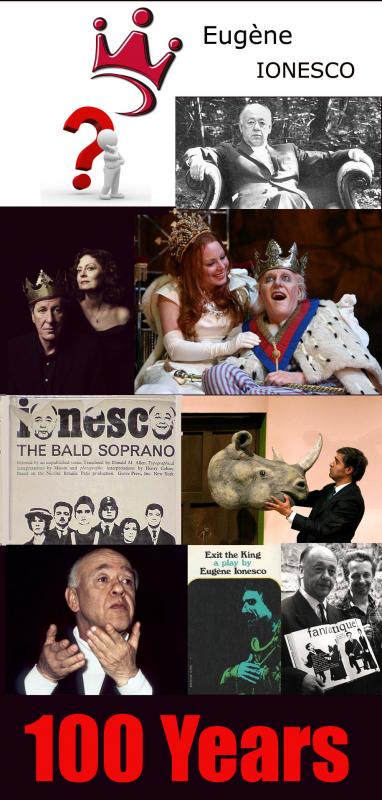
“On finira bien par restaurer la Monarchie, un jour, contre la dictature et l’anarchie ” (*) – Eugène Ionesco
(*)English Translation: “We will probably restore the Monarchy in my country to put an end to dictatorship and anarchy” – Eugène Ionesco
French-Rumanian playwright and dramatist Eugène Ionesco born Nov 26th 2009 was a prominent figure of the Theatre of the Absurd. Ironically the author of Exit the King, was also a passionate advocate for the Restoration of the Monarchy in Rumania after Communist Dictator Nicolae Ceauşescu’s fall.
What an Irony and coincidence that the day of Ionesco’s 100th anniversary Iran’s President Ahmadinejad state visit to Venezuela was marked by an incident that would have certainly inspired Ionesco …
The Pre Revolution Imperial Iranian National Antheme greeted the Iranian President’s arrival to Caracas rather than the official national anthem of the current clerical regime:
“Sorood e Shahanshahi” for Ahmadinejad
Indeed ironically in the late 1980’s Eugene Ionesco deeply dissappointed by the legacy of the communist era in his country passionately supported the Return of Michael of Rumania the last King who briefly had reigned before the country’s fall into the communist hemisphere after WWII.
Royal Family Return to Rumania ( although Monarchy was never restored):
Romanian Kings and Rulers
His plays such as the Bald Soprano or Rhinoceros have been played worldwide including in Iran where in recent years it has gained considerable popularity. One of his most famous plays Exit the King (1962) has recently won popular acclaim at this years Tony Awards for Geoffery Rush and co star Susan Serandon. Beyond ridiculing the most banal situations, Ionesco’s plays depict in a tangible way the solitude and insignificance of human existence. His Play rhinoceroses was also adapted to the Screen in 1974 with Gene Wilder in the title role.
Bérenger, a central character in a number of Ionesco’s plays, the last of which is Le Piéton de l’air translated as A Stroll in the Air.
Bérenger is a semi-autobiographical figure expressing Ionesco’s wonderment and anguish at the strangeness of reality. He is comically naïve, engaging the audience’s sympathy. In The Killer he encounters death in the figure of a serial killer. In Rhinocéros he watches his friends turning into rhinoceroses one by one until he alone stands unchanged against this tide of conformism. It is in this play that Ionesco most forcefully expresses his horror of ideological conformism, inspired by the rise of the fascist Iron Guard in Romania in the 1930s. Le Roi se meurt translated as Exit the King (1962) shows him as King Bérenger 1st, an everyman figure who struggles to come to terms with his own death. More on Ionesco and his works here
An Interview with Eugene Ionesco – Screener (1961)
Geoffrey Rush Triumphant in ‘Exit the King’
Geoffrey Rush – Tony Awards 2009 (Exit the King)
Hollywood Adaptation of Rhinoceros (1974) with Gene Wilder – trailer
A Summary of Rhinoceros:
BBC Persian Coverage of the Persian Adaptation of Ionesco’s works:
To read and listen Go Here
Recommended Reading:
“Rhinoceros” most popular play of the year in Iran (Tehran Times)
Related Blog:
Yasmina Reza Wins 2009 Tony Award for Best Play (June 8th)






